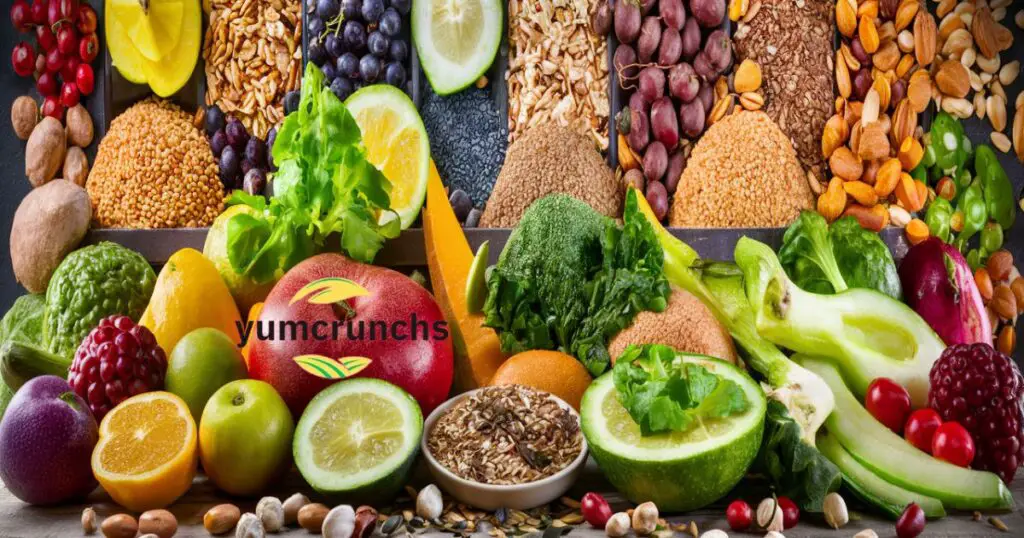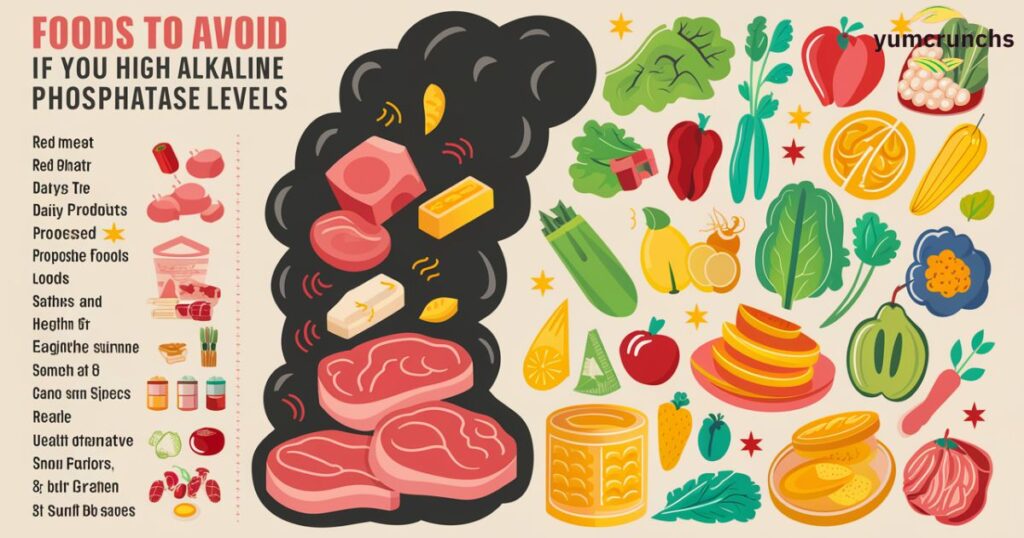Alkaline phosphatase is an enzyme discovered in numerous tissues at some stage in the body, together with the liver, bones, kidneys, and intestines. When ranges of alkaline phosphatase are high inside the blood, it is able to indicate underlying fitness issues which include liver ailment, bone disorders, or positive cancers. Monitoring alkaline phosphatase degrees is vital for keeping typical fitness and identifying capability medical concerns.
Are you thinking about what ingredients may contribute to improved alkaline phosphatase levels? Understanding which meals to keep away from can play a huge function in dealing with your fitness. By making informed dietary alternatives, you may aid efforts to adjust alkaline phosphatase degrees and sell typical nicely-being. Let’s delve into some key insights on ingredients to influence clean of if you’re coping with excessive alkaline phosphatase stages.
Certain foods may exacerbate high alkaline phosphatase levels, making it essential to be mindful of your dietary intake. For instance, processed foods high in sugar and unhealthy fats can strain the liver and contribute to elevated enzyme levels. Additionally, excessive alcohol consumption and consumption of certain medications may also impact alkaline phosphatase levels. By prioritizing a balanced diet rich in fruits, vegetables, lean proteins, and whole grains, you can help maintain optimal alkaline phosphatase levels and support your overall health.
Navigating Alkaline Phosphatase Levels Through Dietary Modifications
Maintaining balanced alkaline phosphatase (ALP) levels is crucial for overall health. Certain dietary adjustments can help manage these levels effectively. Avoid processed foods, excess sugar, and alcohol for optimal results. What is alkaline phosphatase (ALP)?
Focus on a diet rich in fruits, vegetables, and lean proteins. Regular monitoring and adjustments can support healthy (ALP) levels.
The Role of Alkaline Phosphatase
Alkaline phosphatase plays a vital role in bone mineralization, helping to regulate calcium and phosphate levels in the body, essential for bone growth and repair. How Long Can Spiders Live Without Food?
Moreover, (ALP) is also important in liver function. It aids in the metabolism of proteins and fats. Monitoring its levels can provide insights into liver health.
Foods to Avoid with Elevated Alkaline Phosphatase

When (ALP) levels are high, certain foods should be avoided. High-fat dairy products like cheese and whole milk should be limited. Additionally, fatty meats such as beef and pork can contribute to elevated levels.
Furthermore, processed foods and sugary snacks should be reduced in the diet. Alcohol consumption should also be moderated or avoided altogether. Maintaining a balanced diet with plenty of fruits, vegetables, and lean proteins is key.
1. Fatty Foods

High-fat foods should be limited when alkaline phosphatase levels are high. This includes fatty meats like beef, pork, and lamb. Additionally, fried foods and dishes cooked in heavy oils should be avoided.
Moreover, processed foods containing unhealthy fats should be reduced in the diet. These include packaged snacks, fast food, and processed meats like sausages and bacon. Opting for leaner protein sources and healthier cooking methods can help manage (ALP) levels.
2. Alcohol
Limiting or avoiding alcohol is essential with high (ALP) levels. Alcohol can strain the liver, leading to further increases in enzyme levels. Beer, wine, and spirits should be consumed in moderation or avoided altogether. Staying hydrated with water or herbal teas is a healthier alternative.
3. Refined Sugars
Reducing refined sugars is vital for managing high (ALP) levels. Avoiding sugary snacks, candies, and desserts can help stabilize enzyme levels. Additionally, beverages like soda and sweetened drinks should be limited. Opting for natural sweeteners like honey or fruits can satisfy cravings without spiking enzyme levels.
4. Processed Foods

Cutting down on processed foods is crucial for managing high alkaline phosphatase levels. These foods often contain unhealthy fats, sugars, and additives. Avoiding packaged snacks, canned goods, and pre-packaged meals can help stabilize enzyme levels. Instead, focus on whole, unprocessed foods like fruits, vegetables, and lean proteins.
5. High-Protein Food
Limiting high-protein foods can help manage elevated alkaline phosphatase levels. While protein is essential, excessive consumption can strain the liver. Foods like red meat, poultry, and certain seafood should be consumed in moderation. Opting for plant-based protein sources like beans, lentils, and tofu can be a healthier choice. Balancing protein intake with other nutrient-rich foods is key for overall health.
Understanding Normal Alkaline Phosphatase Ranges
Normal (ALP) levels vary depending on age and health. In adults, the typical range is 20 to 140 units per liter of blood. Higher levels may indicate liver or bone issues, while lower levels are usually harmless.
During childhood and adolescence, (ALP) levels tend to be higher. This is due to the rapid growth and development of bones. Understanding these ranges helps healthcare providers assess overall health.
Personalized Diet Plans for High Alkaline Phosphatase

Creating personalized diet plans for high (ALP) involves focusing on specific foods. Emphasize fruits, vegetables, and whole grains to support overall health. Limiting fatty foods, processed sugars, and alcohol can help manage enzyme levels effectively.
Additionally, incorporating lean proteins and reducing high-fat dairy products supports liver health. Balancing nutrient intake and staying hydrated are essential components of these plans. Consulting with a healthcare professional or dietitian ensures personalized and effective dietary recommendations.
Dietary Impact on Alkaline Phosphatase Levels
Diet plays a crucial role in influencing (ALP) levels in the body. Consuming a balanced diet rich in fruits, vegetables, and whole grains can help maintain optimal enzyme levels. These foods provide essential nutrients that support overall health and liver function.
On the other hand, excessive consumption of fatty foods, processed sugars, and alcohol can elevate (ALP) levels. Such dietary choices may strain the liver and lead to imbalances in enzyme production. Monitoring dietary habits and making healthier food choices can positively impact alkaline phosphatase levels and promote overall well-being.
Foods Known to Lower Alkaline Phosphatase

Certain foods are associated with lowering (ALP) levels. Consuming foods rich in vitamin D, such as fatty fish like salmon and fortified dairy products, can support bone health and help regulate enzyme levels. Additionally, incorporating leafy greens like spinach and kale, which are high in calcium and other essential nutrients, may have a positive effect on (ALP) levels.
Furthermore, antioxidant-rich foods like berries, nuts, and seeds can help reduce inflammation and support liver function, potentially lowering (ALP) levels. Including probiotic-rich foods like yogurt and kefir in the diet may also promote gut health, which can indirectly affect enzyme levels. However, it’s essential to consult with a healthcare professional for personalized dietary recommendations tailored to individual health needs.
FAQ’s
What high-phosphorus foods should be avoided with elevated alkaline phosphatase levels?
Dairy products like milk and cheese.
Which types of fatty foods should individuals with high alkaline phosphatase levels limit?
Fried foods and fatty meats.
Are there specific vegetables to avoid when alkaline phosphatase is elevated?
Yes, spinach and other dark leafy greens.
Conclusion
In considering the dietary impact on alkaline phosphatase levels, it becomes evident that small changes in food choices can yield significant health benefits. Opting for foods rich in vitamin D, calcium, and antioxidants can help regulate enzyme levels and support overall well-being. By prioritizing a balanced diet that includes plenty of fruits, vegetables, and lean proteins, individuals can take proactive steps toward optimizing their health.
Reflecting on the foods known to lower alkaline phosphatase, one might wonder about the broader implications of dietary habits on overall health. How might incorporating more nutrient-dense foods into your meals positively impact not only alkaline phosphatase levels but also other aspects of your health journey?

Daniel, a seasoned author with 8 years of expertise in SEO, brings a delectable blend of culinary flair and digital finesse to the food niche on his website.


